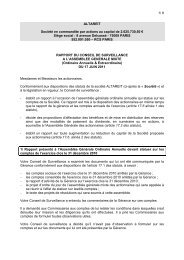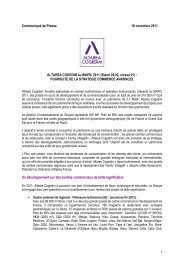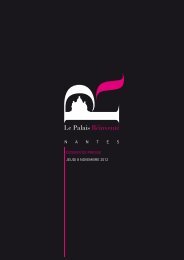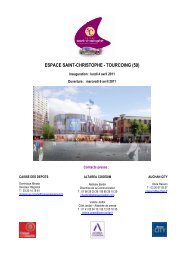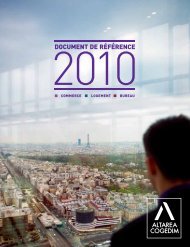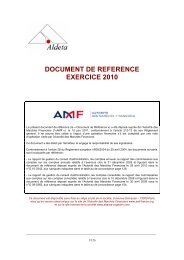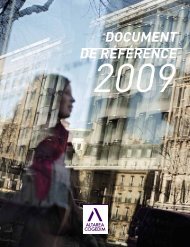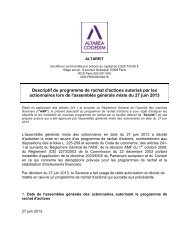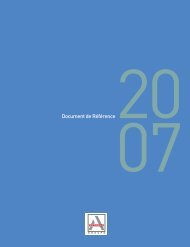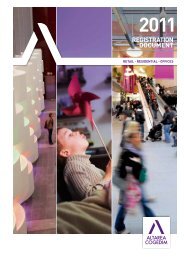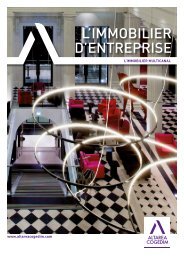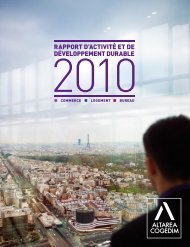Annual report 2008 - Altarea Cogedim
Annual report 2008 - Altarea Cogedim
Annual report 2008 - Altarea Cogedim
Create successful ePaper yourself
Turn your PDF publications into a flip-book with our unique Google optimized e-Paper software.
e) Short-term benefits<br />
Short-term benefits include an incentive agreement for<br />
employees to share in the profit recorded by their economic<br />
and social unit, signed by the service companies of the<br />
Group that are members of the economic and social unit,<br />
and the works council (non-mandatory profit-sharing plan).<br />
Benefits also include a (mandatory) employee profit-sharing<br />
applicable to the profit of the economic and social unit as<br />
required under ordinary law.<br />
Short-term employee benefits including those arising from<br />
these profit-sharing plans are expensed as incurred.<br />
7.22. Provisions and contingent liabilities<br />
In accordance with IAS 37, a provision is recognised when<br />
an obligation to a third party will certainly or probably result<br />
in an outflow of resources without any equivalent benefits<br />
being received in consideration, and when the amount<br />
required to settle the obligation can be reliably estimated.<br />
The provision is maintained as long as the timing and amount<br />
of the outflow of resources are not known with precision.<br />
In general, provisions are not linked to the Group’s normal<br />
operating cycle. Provisions are discounted when appropriate<br />
using a pre-tax discount rate that reflects the risks specific<br />
to the liability.<br />
Non-current provisions consist mainly of provisions arising<br />
from litigation between the ALTAREA group and third parties.<br />
Contingent liabilities correspond to a potential obligation for<br />
which the probability of occurrence or a reliable estimate of<br />
the amount cannot be determined. They are not recognised on<br />
the balance sheet. A disclosure is made in the notes unless the<br />
amounts at stake can reasonably be expected to be small.<br />
7.23. Income taxes<br />
Following its decision to adopt SIIC tax status, the ALTAREA<br />
group is subject to a specific tax regime. For tax purposes,<br />
the Group is divided into two sectors:<br />
• an SIIC sector comprising the Group companies that have<br />
elected to adopt SIIC tax status and are therefore exempt<br />
from income tax on their ordinary profits and gains on<br />
disposal, and<br />
• a taxable sector comprising those companies that cannot<br />
elect to adopt SIIC status.<br />
Income taxes are recognised in accordance with IAS 12.<br />
From the time that SIIC tax status was adopted, deferred<br />
taxes are calculated for companies without such status and on<br />
the taxable profits of companies in the SIIC sector. Deferred<br />
taxes are recognised on all timing differences between<br />
the carrying amounts of assets and liabilities for financial<br />
<strong>report</strong>ing purposes and their values for tax purposes, and on<br />
tax loss carryforwards, using the liability method.<br />
The carrying amount of deferred tax assets is reviewed<br />
at each balance sheet date and reduced if it is no longer<br />
probable that sufficient future taxable profits will be available<br />
to permit utilisation of all or part of the deferred tax assets.<br />
Deferred tax assets are reassessed at each balance sheet<br />
date and are recognised where it is likely that future taxable<br />
profits will allow their recovery based on a business plan for<br />
tax purposes prepared by management and derived from the<br />
Group’s five-year business plan.<br />
Deferred tax assets and liabilities are measured using the<br />
liability method at the tax rates expected to apply when the<br />
asset will be realised or the liability settled, on the basis of<br />
known tax rates at the balance sheet date.<br />
Taxes on items recognised directly in equity are also<br />
recognised in equity, not in the income statement.<br />
Deferred tax assets and liabilities are offset when they relate<br />
to the same tax entity and the same tax rate.<br />
7.24. Revenue and revenue-related expenses<br />
Income from ordinary activities is recognised when it is<br />
probable that future economic benefits will flow to the Group<br />
and the amounts of income can be reliably measured.<br />
a) Net rental income<br />
Net rental income is rental revenues and other net rental<br />
income less land expenses, non-recovered service charges<br />
and management fees.<br />
Rental revenues include gross rent payments, including the<br />
effects of spreading stepped rents over the non-cancellable<br />
lease term, rent holidays and other benefits granted by<br />
contract to the lessee by the lessor.<br />
Other net rental income includes revenues and expenses<br />
recognised on initial lease payments received, termination<br />
fees received and early termination fees paid to tenants.<br />
Termination fees are charged to tenants when they terminate<br />
the lease before the end of the contract term. They are<br />
recognised in income when charged. Termination fees paid<br />
to tenants in return for vacating the premises before term<br />
are expensed where it is not possible to demonstrate that<br />
enhancement of the rental profitability of the property is<br />
attributable to the tenants’ removal.<br />
Land expenses correspond to amounts paid for fees and on<br />
very long-term land leases and construction leases, both of<br />
which are treated as operating leases.<br />
Non-recovered service charges correspond to charges that<br />
are normally passed on to tenants (building maintenance<br />
expenses, local taxes, etc.) but are borne by the owner<br />
because of caps on rebilling or because some rental<br />
premises are vacant.<br />
Management fees include all other expenses associated with<br />
the rental business: rental management fees, letting fees<br />
95



